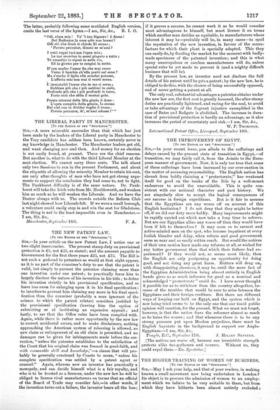THE NEW PATENT LAW. [To THE EDITOR OF THE "SPECTATOR.')
&a,—In your article on the new Patent Law, I notice one or two slight inaccuracies. The present stamp duty on provisional protection is 25, not 225, as stated ; and the amount payable to Government for the first three years L'25, not 275. The Bill is not such a godsend to patentees as would at first sight appear, as it is no part of the examiner's duty to see that the patent is valid, but simply to prevent the patentee claiming more than one invention under one patent ; to practically force him to largely disclose the nature of his invention in his title ; to define his invention strictly in his provisional specification, and so leave less room for enlarging upon it in his final specification ; to interfere to prevent him claiming any more in his final speci- fication than the examiner (probably a man ignorant of the science to which the patent relates) considers justified by the provisional specification (leaving him the option of submitting or of instituting an expensive appeal) ; and lastly, to see that the Office rules have been complied with. Again, while there is rather more opportunity by the new law to correct accidental errors, and to make disclaimers, nothing approaching the American system of reissuing is allowed, no new claim or enlargement of an old claim is permitted, and no damages can be given for infringements made before the con. section, "unless the patentee establishes to the satisfaction of the Court that his original claim was framed in good-faith, and with reasonable skill and knowledge,"—a clause that will pro- bably be generally construed by Courts to mean, "unless his complete specification was settled by a patent agent or counsel." Again, whereas now an inventor has practically a monopoly, and can decide himself what is a fair royalty, and who is to be trusted as a licencee, under the new law he will be obliged to license rival manufacturers on terms that an official of the Board of Trade may consider fair,—in other words, if the invention turns out a failure, the inventor bears all the loss;
if it proves a success, he cannot work it as he would consider most advantageous to himself, but must license it on terms which another man decides as equitable, to manufacturers whose interest it may be—probably will be, in many cases—to spoil the reputation of the new invention, in favour of the manu- facture for which their plant is specially adapted. This they can easily do, by flooding the market for the moment with badly- made specimens of the patented invention ; and this is what many unscrupulous or careless manufacturers will do, unless special rules be yet made to prevent it (and a mighty difficult business that will be).
By the present law, an inventor need not disclose the full details of his patent until he gets a patent; by the new law, he is obliged to do this, with the chance of being successfully opposed, and of never getting a patent at all.
The only real, substantial advantages a patentee obtains under the new law are, the first cost is greatly lessened, the after stamp duties are practically lightened, and racing for the seal, to avoid or take advantage of the flagrant injustice exemplified in the case of Bates and Redgate is abolished. The increase in dura- tion of provisional protection is hardly an advantage, as it also increases the period of uncertainty and risk.—I am, Sir, &c., W. P. THOMPSON. International Patent Office, LiveTool, September 18th.


































 Previous page
Previous page